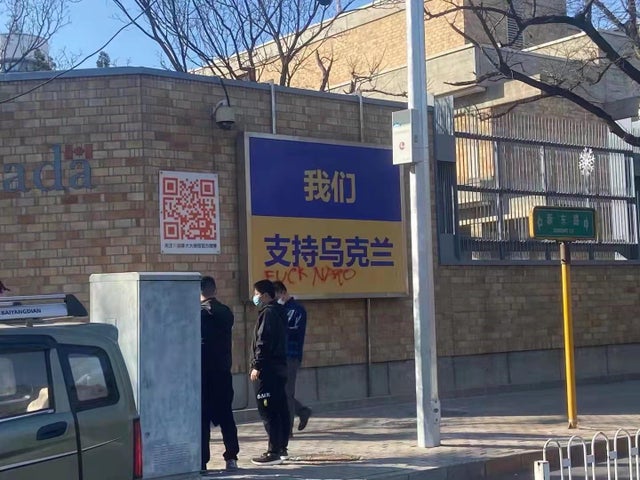China cracks down on pro-Ukrainian voices
UPDATED 16 MARCH with blocking of Carter Centre's US-China Perception Monitor website.
China strictly controls news media and online content when it concerns domestic issues, but it doesn’t usually closely interfere with what’s said online about foreign news.
That now appears to have changed with a programme of disinformation, censorship and propaganda against pro-Ukrainian voices whether they be by state media, overseas Chinese social media users, celebrities or scholars. Even foreign football matches are not immune.
[Photo shows a sign outside the Canadian Embassy in Beijing reading “We support Ukraine” defaced by anti-NATO graffiti. Credit: @r_karlis/Twitter]
Website censorship
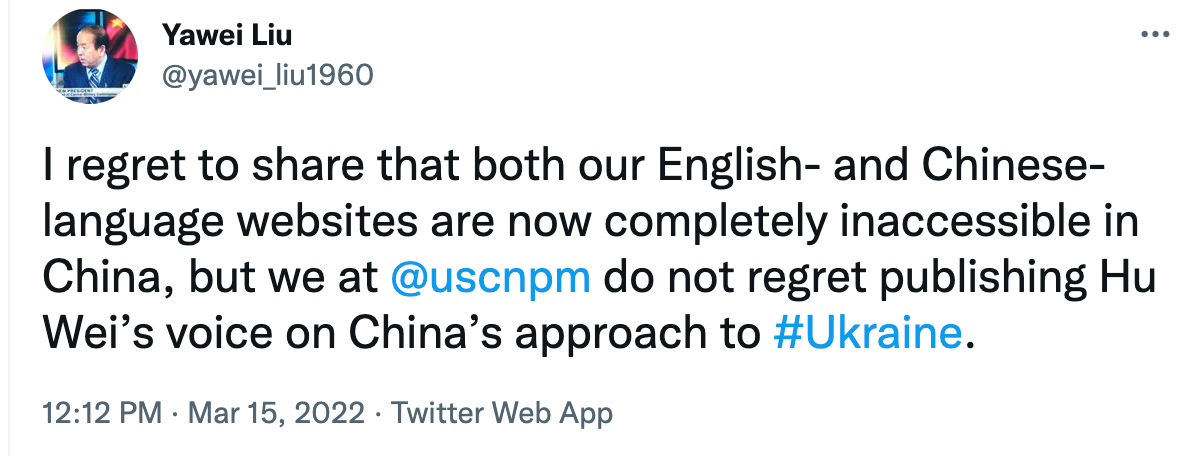 The Chinese and English websites of the US-based Carter Centre's US-China Perception Monitor were blocked in China on 15 March. This follows the publication in both languages of an essay by Chinese scholar Hu Wei, who warned that it was not in China's best interests to ally itself with Russia over the war in Ukraine and that Beijing should seek to distance itself from Moscow.
The Chinese and English websites of the US-based Carter Centre's US-China Perception Monitor were blocked in China on 15 March. This follows the publication in both languages of an essay by Chinese scholar Hu Wei, who warned that it was not in China's best interests to ally itself with Russia over the war in Ukraine and that Beijing should seek to distance itself from Moscow.
Police harassment
An activist in Hunan, Peng Peiyu, was taken away by police in the early hours of the morning of 3 March after he posted online his intentions to hold an anti-war protest outside the Russian embassy in Beijing.
Police pulled a lone protester off the streets of Hangzhou in eastern China on 26 February for holding up a banner showing support for Ukraine. He was released a few hours later.
Twitter user @watchwci posted a letter that claimed to be from the Ukrainian consulate in Shanghai to the local governments of Shanghai, Jiangsu, Anhui, Zhejiang, Jiangxi and Fujian. The letter asked officials to stop police harassment of Ukrainian citizens who said they had been called in for questioning or grilled on the phone after they had expressed their opinions about Russia’s aggression. While the letter looks genuine, it has not yet been verified.
Football matches censored
English Premier matches were blocked in China on the weekend 5-6 March because of planned shows of solidarity with Ukraine. Using the banner “Football Stands Together”, club captains wore armbands in the colours of the Ukraine flag.
Celebrity Weibo bans
A number of well-known Weibo (China’s Twitter) users have apparently had their accounts suspended after posting pro-Ukraine or anti-war comments. Among them are renowned modern dancer Jin Xing (also the country’s most famous transwoman) with 13.6 million followers and actress Ke Lan, with almost 3 million followers ,after posting a video of an anti-war protest in Russia to the site.
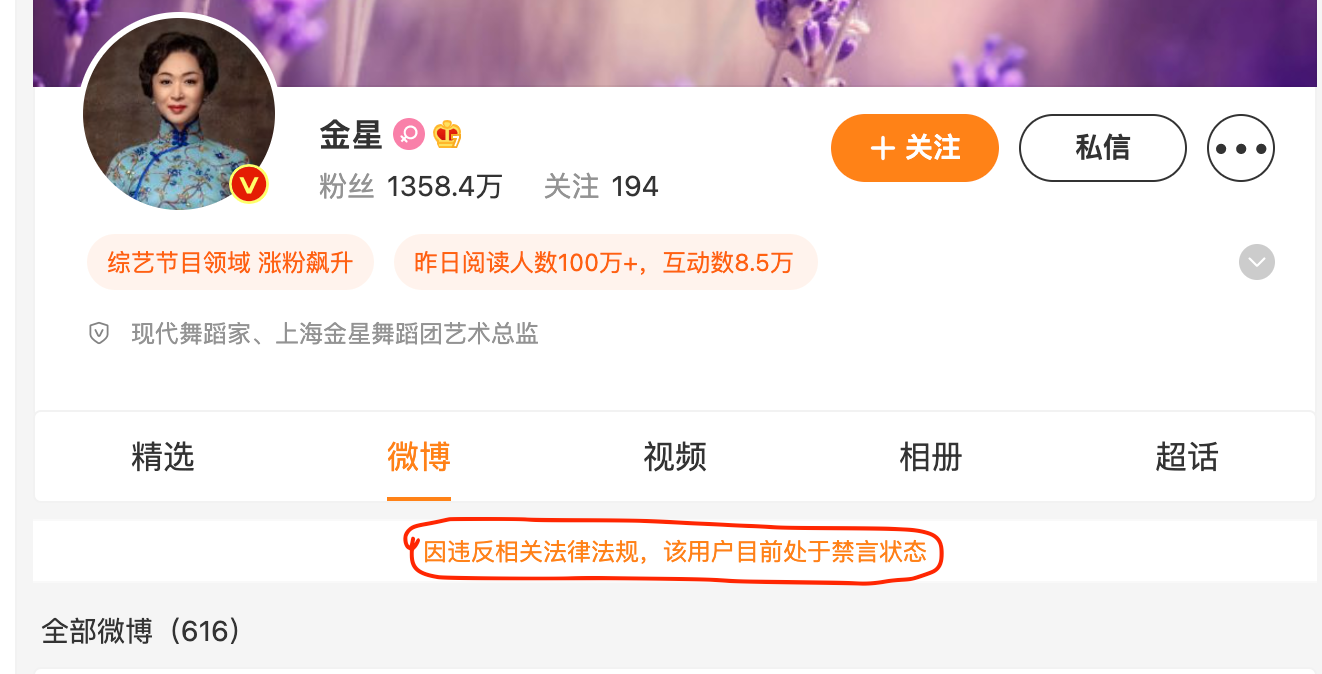
[Screenshot of Jin Xing’s Weibo page, the text circled in red says that the user has been blocked from posting because of violating laws or regulations]
Media censorship
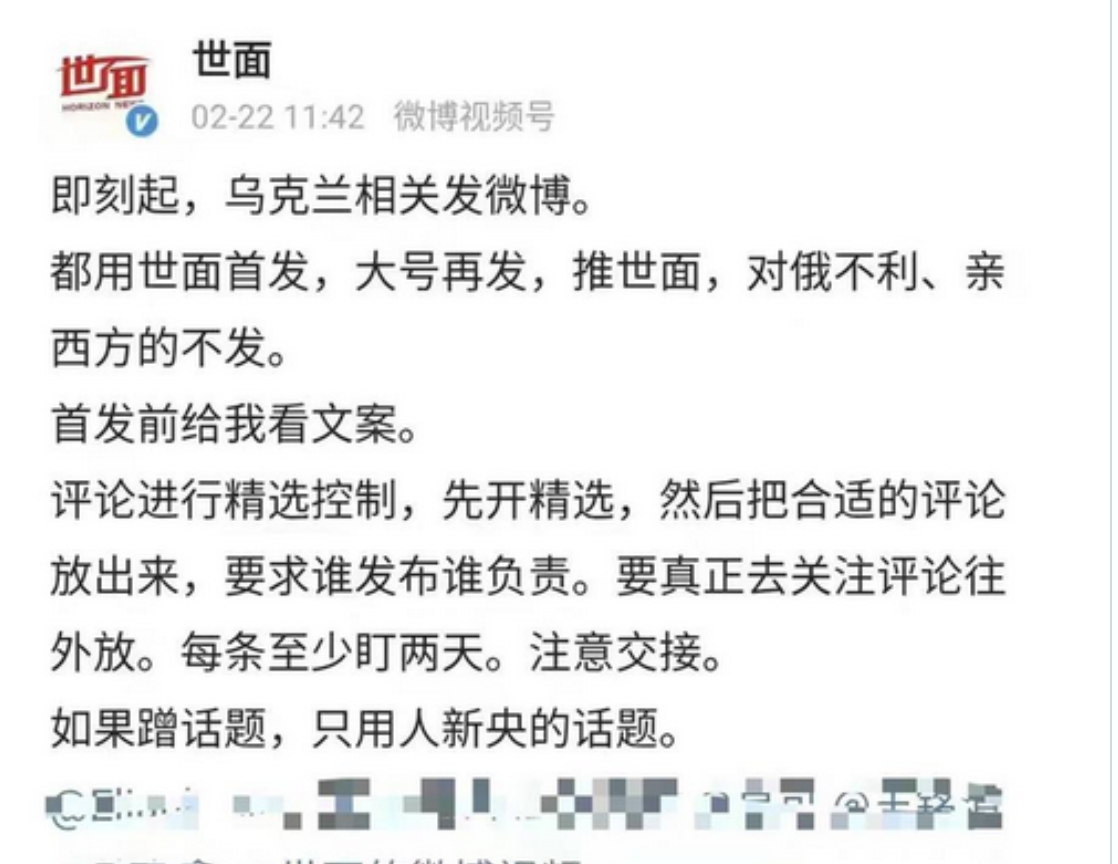 Comically, China’s intention to skew coverage in Russia’s favour appeared to have been accidentally leaked at the end of February.
Comically, China’s intention to skew coverage in Russia’s favour appeared to have been accidentally leaked at the end of February.
State media outlet, Horizon News (世面), inadvertently posted the censorship guidance to its Weibo page. According to the directive, comments or reports that are anti-Russia or pro-West must not be published. The post disappeared a few hours later. 
An open letter by five Chinese historians denouncing the invasion disappeared from the Internet just a few hours after it had been posted.
“We strongly opposed Russia’s war against Ukraine. Russia’s invasion of a sovereign state by force … is a violation of the norms of international relations based on the United Nations charter and a breach of the existing international security system,” Professors Sun Jiang, Wang Lixin, Xu Guoqi, Zhong Weimin, and Chen Yan wrote.
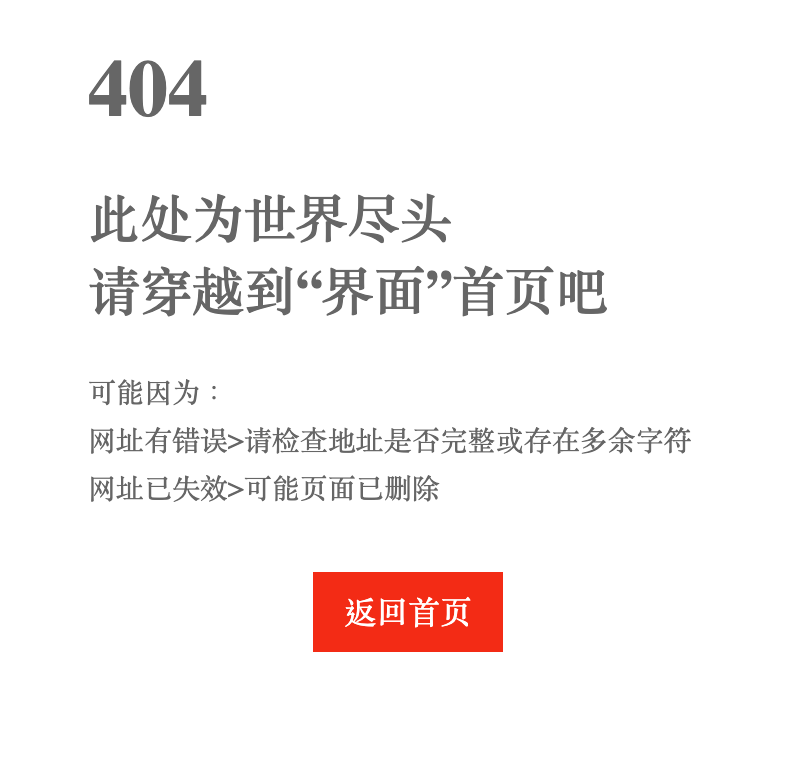 A look at China Digital Times 404 Library, so called because links to censored articles often return a 404 error, as of 2 March record 11 news stories or social media posts on the Russian invasion that were deleted with titles such as “普京入侵乌克兰:危及国运的历史性错误!” (Putin invades Ukraine: an historic mistake that threatens the nation’s fate!) and “全世界乌克兰人最艰难的一天” (The Worse Day for Ukrainians Around the World).
A look at China Digital Times 404 Library, so called because links to censored articles often return a 404 error, as of 2 March record 11 news stories or social media posts on the Russian invasion that were deleted with titles such as “普京入侵乌克兰:危及国运的历史性错误!” (Putin invades Ukraine: an historic mistake that threatens the nation’s fate!) and “全世界乌克兰人最艰难的一天” (The Worse Day for Ukrainians Around the World).
Twitter user @zhaolewisliu said that a Weibo post he wrote with photos of him attending an anti-Putin protest in Los Angeles was scrubbed from Weibo, but not after it had been viewed more than 3 million times. He also said his account was blocked for 30 days.
Another Twitter user, @dong_mengyu said that news and social media platform Toutiao deleted videos of anti-war protests filmed in Russia. “I’ve personally seen at least six different videos deleted,” she wrote.
Meanwhile, the Chinese Internet is flooded with pro-Putin belligerence, such as one female user on Douyin (China’s version of TikTok) who said: "I'm so happy [about the invasion] ... Putin is commanding, firm and charismatic."
However, as this Foreign Policy article explains, Weibo censors are now also cutting excessively pro-Russia content, perhaps because of complaints from Chinese students in Ukraine who were worried about repercussions and also as Beijing shifts from its own overtly pro-Russia anti-West stance to a slightly more neutral would-be peacekeeper role.
Even so, a quick look at the country’s main national news bulletin, xinwenlianbo, for the evening of 2 March, shows that coverage is still overwhelmingly pro-Russia, pushing the line that the conflict can be blamed on the West and Nato and that Russia is targeting military installations and has not killed civilians.
